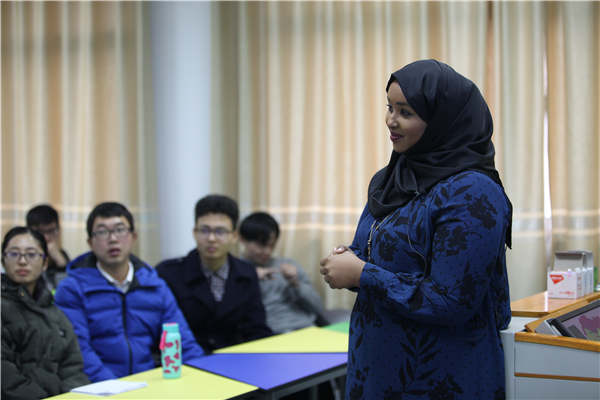 |
|
Hodan Osman Abdi, a Somali academic who presents the diversity of Africans with her documentary film Africans in Yiwu. [Photo provided to China Daily] |
She was not trained as a director. She has no stars in her crew, or even people with acting experiences. However, her documentary has become a big hit, especially with audiences in China and Africa.
Hodan Osman Abdi, a Somali academic who has lived in China for about 12 years, says she is trying to show the diversity of Africans in the eastern parts of China with her recent documentary film Africans in Yiwu.
The six-episode documentary film, which took more than two years to showcase the daily lives of more than 20 people from 15 African countries who live in Yiwu, an export-oriented city in East China's Zhejiang province.
Earlier in 2017, the film was selected as the opening movie for the Lusaka International Film Festival in Zambia. And it has been shown across the world on CCTV-4 and across Africa on StarTimes channels.
"The people in the film are not stars, not big figures. They are just normal people trying to lead better lives and fulfill their dreams. Just like you and me," says Abdi.
Many foreigners come to Yiwu, the city's Party chief Sheng Qiuping said in 2015, when he was the city's mayor - about 15,000 foreign residents from more than 100 countries and regions were in the city then.
In addition, more than 500,000 overseas businesspeople visit Yiwu each year.
The stories of Africans and the Chinese should be told and written by themselves, not by others, the Somali Ambassador to China Yusuf Hassan Ibrahim, said at a ceremony in Beijing which introduced the film.
Abdi, the Somali co-director of the film, also a lecturer in African film and media at the Institute of African studies at Zhejiang Normal University, says she believes the increase in the number of cross-cultural media products catering to both Chinese and African viewers, coupled with the increase in their availability for mass audiences, is playing a positive role in boosting understanding between Chinese and African people.
"Showcasing the fact that both the Chinese and the Africans are diverse people with diverse cultures and habits is significant," she says.
"Ten years ago, the Chinese generally associated Africa with disease, famine and war," she says. "And the number of Africans living in China wasn't that big either. But now the general perception of Africa in China is gradually changing for the better.
"They no longer think Africa is a single country. And an increasing number of people are able to tell that it is a large continent with diverse people and diverse cultures.
Abdi also believes China's economic boom of the past 10 years has not only increased people's wealth but also opened their eyes.
Africa, which is now appreciated for its natural resources, business opportunities, wonderful weather and beautiful nature, has become a popular travel destination for business and pleasure. The cross-cultural communication that results from these travels is a key factor that has the potential to promote understanding, she says.
The media also plays a key role in shaping common perceptions and misconceptions, she says. "The Chinese media engagement in Africa has been successful in promoting a better understanding of China. However, they still lack the ability to adjust to the specific cultural aspects unique to the African market," she says.
"So, there should also be a focus on the translation and adaptation of popular African literature, film and TV programs to encourage mutual understanding."
Abdi says in her own country, Somalia, most people consider the Chinese to be resilient and diligent.
"The general perception is that the Chinese are hardworking and never slack, and that is why they have been able to achieve the amount of success they have in such a short time," she says, adding that the older generation remember the complex and good-quality infrastructure projects constructed by Chinese companies and often praise their knowledge and abilities.
The biggest similarity between China and Somalia is that both countries are proud of their long history. The respect for customs and traditions is something they share, she says.